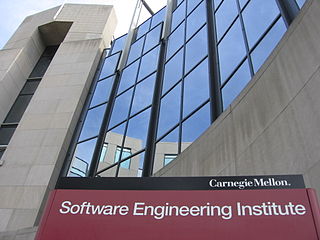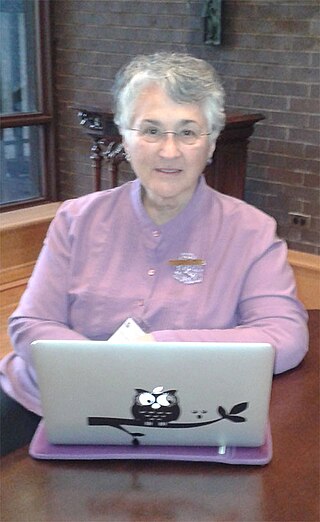Related Research Articles
Software engineering is an engineering approach to software development. A practitioner, a software engineer, applies the engineering design process to develop software.

Software Engineering Institute (SEI) is a federally funded research and development center in Pittsburgh, Pennsylvania, United States. Founded in 1984, the institute is now sponsored by the United States Department of Defense and the Office of the Under Secretary of Defense for Research and Engineering, and administrated by Carnegie Mellon University. The activities of the institute cover cybersecurity, software assurance, software engineering and acquisition, and component capabilities critical to the United States Department of Defense.

Configuration management (CM) is a systems engineering process for establishing and maintaining consistency of a product's performance, functional, and physical attributes with its requirements, design, and operational information throughout its life. The CM process is widely used by military engineering organizations to manage changes throughout the system lifecycle of complex systems, such as weapon systems, military vehicles, and information systems. Outside the military, the CM process is also used with IT service management as defined by ITIL, and with other domain models in the civil engineering and other industrial engineering segments such as roads, bridges, canals, dams, and buildings.
Documentation is any communicable material that is used to describe, explain or instruct regarding some attributes of an object, system or procedure, such as its parts, assembly, installation, maintenance, and use. As a form of knowledge management and knowledge organization, documentation can be provided on paper, online, or on digital or analog media, such as audio tape or CDs. Examples are user guides, white papers, online help, and quick-reference guides. Paper or hard-copy documentation has become less common. Documentation is often distributed via websites, software products, and other online applications.
In software engineering, software configuration management is the task of tracking and controlling changes in the software, part of the larger cross-disciplinary field of configuration management. SCM practices include revision control and the establishment of baselines. If something goes wrong, SCM can determine the "what, when, why and who" of the change. If a configuration is working well, SCM can determine how to replicate it across many hosts.
The following outline is provided as an overview of and topical guide to software engineering:
ISO/IEC/IEEE 12207Systems and software engineering – Software life cycle processes is an international standard for software lifecycle processes. First introduced in 1995, it aims to be a primary standard that defines all the processes required for developing and maintaining software systems, including the outcomes and/or activities of each process.
In software project management, software testing, and software engineering, verification and validation (V&V) is the process of checking that a software system meets specifications and requirements so that it fulfills its intended purpose. It may also be referred to as software quality control. It is normally the responsibility of software testers as part of the software development lifecycle. In simple terms, software verification is: "Assuming we should build X, does our software achieve its goals without any bugs or gaps?" On the other hand, software validation is: "Was X what we should have built? Does X meet the high-level requirements?"
ISO/IEC 15504Information technology – Process assessment, also termed Software Process Improvement and Capability dEtermination (SPICE), is a set of technical standards documents for the computer software development process and related business management functions. It is one of the joint International Organization for Standardization (ISO) and International Electrotechnical Commission (IEC) standards, which was developed by the ISO and IEC joint subcommittee, ISO/IEC JTC 1/SC 7.

JoAnn T. Hackos is a lecturer, consultant, and author of a number of books about technical communication. Now retired, Hackos is the founder of the Center for Information-Development Management (CIDM) and the president emeritus of Comtech Services in Denver, Colorado. She is also a fellow and past president of the Society for Technical Communication. She is a member of the IEEE Standards Association and active in the ISO SC7 Working Groups that is developing standards for information developers. She is the co-author of the standards on content management and information-development management.
In the context of software engineering, software quality refers to two related but distinct notions:
Quality management ensures that an organization, product or service consistently functions well. It has four main components: quality planning, quality assurance, quality control and quality improvement. Quality management is focused not only on product and service quality, but also on the means to achieve it. Quality management, therefore, uses quality assurance and control of processes as well as products to achieve more consistent quality. Quality control is also part of quality management. What a customer wants and is willing to pay for it, determines quality. It is a written or unwritten commitment to a known or unknown consumer in the market. Quality can be defined as how well the product performs its intended function.
Software quality assurance (SQA) is a means and practice of monitoring all software engineering processes, methods, and work products to ensure compliance against defined standards. It may include ensuring conformance to standards or models, such as ISO/IEC 9126, SPICE or CMMI.
Richard Turner is a distinguished service professor in the School of Systems and Enterprises of Stevens Institute of Technology in Hoboken, New Jersey.
Quality engineering is the discipline of engineering concerned with the principles and practice of product and service quality assurance and control. In software development, it is the management, development, operation and maintenance of IT systems and enterprise architectures with high quality standard.
Professor Benjamin Wan-Sang Wah is the Wei Lun Professor of Computer Science and Engineering at the Chinese University of Hong Kong, as well as the former provost of this university. He was elected President of IEEE Computer Society in 2001.
Martha Ann Evans Sloan is an American electrical engineer. She taught engineering for many years at Michigan Technological University, and became the first female president of the IEEE. Her service to the profession has been honored by several society fellowships and awards.
Helen M. Wood is an American computer scientist who worked for many years at the National Bureau of Standards, directed the Office of Satellite Data Processing and Distribution in the National Oceanic and Atmospheric Administration, and served as president of the IEEE Computer Society.
Doris Loveday Carver (1946–2024) was an American computer scientist and software engineer at Louisiana State University, where she was Dow Chemical Distinguished Professor of Computer Science and Engineering, and director of the Software Engineering Laboratory. She was the former president of the IEEE Computer Society and editor-in-chief of IEEE Computer.
References
- 1 2 "Women in STEM with Kathy Land", Tech News, IEEE Computer Society, retrieved 2023-06-08
- 1 2 3 4 5 Yost, Jeffrey R. (September 3, 2014), Susan K. ("Kathy") Land: An interview, IEEE Computer Society
- ↑ Goodrich, Joanna (October 7, 2019), "Susan K. "Kathy" Land Is 2020 IEEE President-Elect", IEEE Spectrum, retrieved 2023-06-08
- ↑ "Richard E. Merwin Award for Distinguished Service", Awards, IEEE Computer Society, retrieved 2023-06-08
- ↑ IEEE Fellows directory, IEEE, retrieved 2023-06-08
- ↑ Ben-Menachem, Mordechai (May 2008), "Review of Practical Support for ISO 9001 Software Project Documentation", ACM SIGSOFT Software Engineering Notes, 33 (3), Association for Computing Machinery: 1–1, doi:10.1145/1360602.1373362